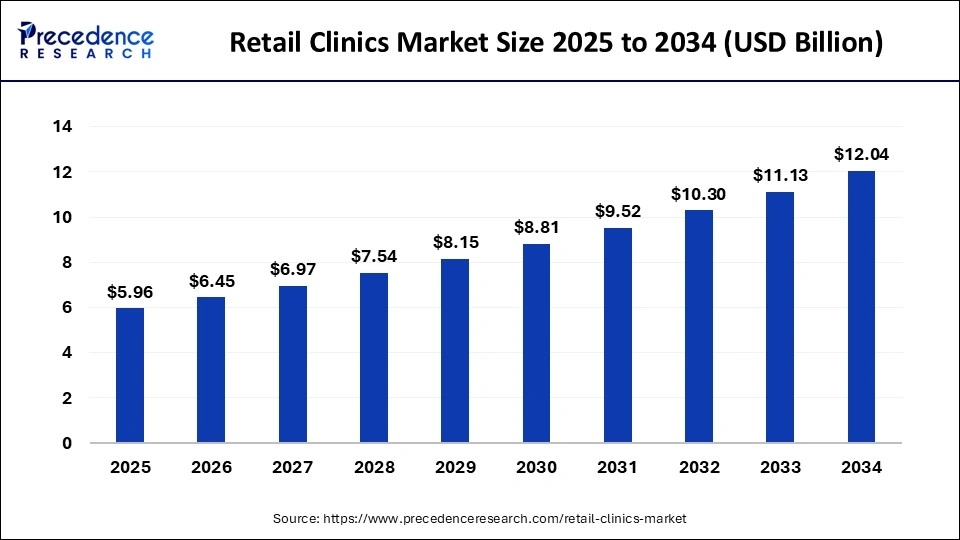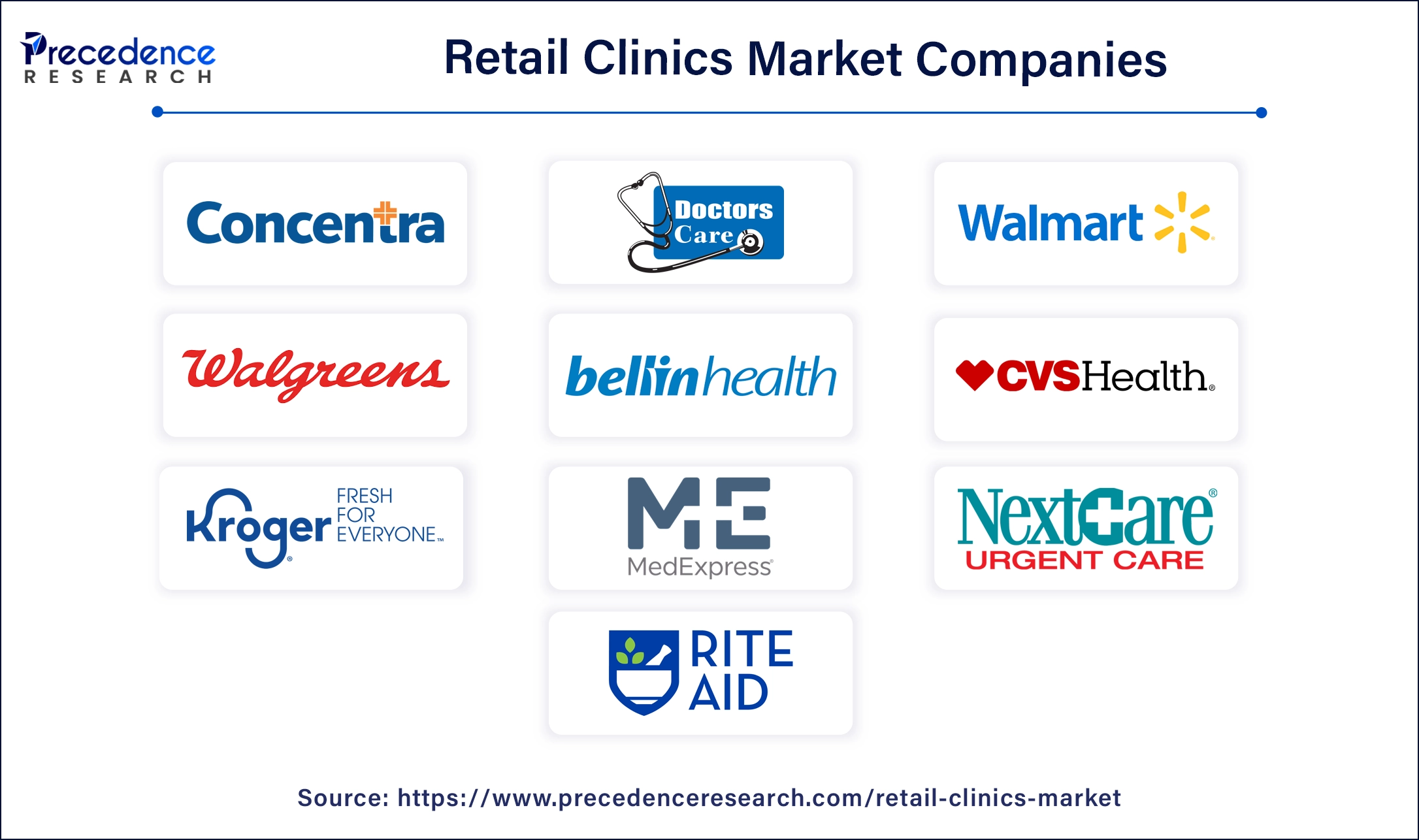October 2024
Retail Clinics Market (By Application: Point-of-care Diagnostics, Clinical Chemistry & Immunoassays, Vaccinations, Others; By Distribution Channel: Retail Pharmacy Settings, Drug Stores, Grocery Chains & Big Box Stores; By Ownership Type: Hospital-owned Retail Clinics, Retail-owned Retail Clinics) - Global Industry Analysis, Size, Share, Growth, Trends, Regional Outlook, and Forecast 2024-2034
The global retail clinics market size was USD 5.10 billion in 2023, calculated at USD 5.51 billion in 2024 and is expected to reach around USD 12.04 billion by 2034, expanding at a CAGR of 8.12% from 2024 to 2034. The retail clinics market is growing due to the rising demand for convenient and accessible healthcare services in retail settings.

Retail clinics serve as treatment facilities where qualified providers offer services and medications outside of traditional offices or emergency departments. Unlike traditional healthcare settings, retail clinics operate on a walk-in basis and do not have observation beds. One of their primary benefits is that patients do not need to schedule appointments to receive medical care. These clinics provide several advantages, such as longer operating hours, reduced wait times, and lower costs, which make them a convenient and appealing option for those seeking immediate, non-emergency healthcare services.
| Report Coverage | Details |
| Market Size by 2034 | USD 12.04 Billion |
| Market Size in 2023 | USD 5.10 Billion |
| Market Size in 2024 | USD 5.51 Billion |
| Market Growth Rate from 2024 to 2034 | CAGR of 8.12% |
| Largest Market | North America |
| Base Year | 2023 |
| Forecast Period | 2024 to 2034 |
| Segments Covered | Application, Distribution Channel, Ownership Type, and Regions |
| Regions Covered | North America, Europe, Asia-Pacific, Latin America, and Middle East & Africa |
Increasing the delivery of vaccines in retail care clinics
The growing incidence of chronic diseases has intensified the focus on healthcare, especially in emerging nations where per capita disposable income is increasing. Improving healthcare infrastructure is important in these regions. Additionally, retail clinics play a vital role in global vaccination programs, which is expected to boost their market potential over the forecast period. Located in high-traffic areas, retail and medical clinics provide a convenient and efficient setting for the prompt administration of immunizations.
Episodic nature of retail clinics
Retail clinics primarily offer basic and routine healthcare services, which may not address complex medical issues or chronic conditions, potentially limiting their attractiveness to a wider patient base. Unlike traditional primary care physicians, retail clinics provide a different level of continuity of care. The episodic nature of visits to retail clinics makes it challenging to establish long-term patient-provider relationships, which can affect the management of chronic conditions and, hence, restrain the retail clinics market growth.
Integration of telemedicine
Retail clinics can enhance patient access to care by giving virtual consultations and remote monitoring. The integration of telemedicine into retail clinics is expected to create numerous opportunities in the retail clinics market. Utilizing data analytics to improve patient outcomes, boost operational efficiency, and cut costs will make significant market prospects. Over the projected period, it is anticipated that increased initiatives will lead to the establishment of new walk-in healthcare facilities. One key advantage of these expansion activities is the improved accessibility for patients, which results in a higher number of visits to these clinics.
The point-of-care diagnostics segment held a significant share of the retail clinics market in 2023. Point-of-care diagnostics are typically less expensive than lab-based tests, reducing the overall cost of care for patients. This affordability aligns with the retail clinics’ goal of providing accessible and economical healthcare services. Advances in technology have led to the development of highly accurate and reliable point-of-care diagnostic devices. These devices are user-friendly and require minimal training, making them ideal for use in retail clinics. The significant share of the point-of-care diagnostics segment in the retail clinics market is driven by the demand for convenience, cost-effectiveness, patient-centered care, technological advancements, and the ability to support public health initiatives.
The retail-owned segment dominated the retail clinics market in 2023. This can be attributed to an increasing trend of retailers owning and operating healthcare facilities, including clinics and pharmacies. Retailers see opportunities for revenue growth and diversification by incorporating healthcare services into their business models. The evolving healthcare landscape, characterized by a growing demand for accessible and affordable healthcare solutions, has prompted retailers to expand their services into the healthcare sector. However, the retail-owned segment aligns with changing consumer preferences and enables retailers to influence the future of integrated healthcare delivery worldwide significantly.
The hospital segment is projected to grow at a significant rate in the retail clinics market during the forecast period. Hospital-owned clinics provide a broader range of services and frequently encompass specialist consultations and management of chronic illnesses. Both categories of clinics strive to deliver accessible and cost-effective healthcare solutions to the public. The main drivers for growth in this segment are increasing income levels, raised awareness in urban regions, and escalating lifestyle-related health needs.
The drug stores segment led the retail clinics market in 2023. Drug stores have a robust infrastructure that provides convenience and accessibility for consumers looking for basic healthcare services. Clinics are usually located within larger retail chains, which makes them convenient for shoppers. Additionally, supermarkets and pharmacies often host these clinics, allowing customers to access healthcare services while doing their regular shopping.
The retail pharmacies segment is expected to show the fastest growth in the retail clinics market over the projected period. Retail pharmacies contribute significantly to this market segment, providing healthcare facilities such as hospitals, clinics, and nursing homes with essential supplies and medications for patient care. The demand from these healthcare institutions represents a crucial revenue stream for the retail pharmacy sector, ensuring efficient patient care. Several key factors propel this growth: technological advancements, including rising consumer demand and evolving consumer preferences. One of the major drivers of the retail pharmacy market is the increasing consumer awareness of health and wellness.
North America led the global retail clinics market in 2023. This growth can be attributed to the presence of established industry leaders, the widespread adoption of advanced healthcare technologies, and the growing demand for convenient and accessible healthcare services. The market in the United States is experiencing expansion due to an improved healthcare system, a rise in infectious disease cases, an aging population, and the availability of high-quality diagnostic tests. Also, the number of elderly individuals in the U.S. is rapidly increasing.
Asia Pacific is expected to grow at the fastest rate in the retail clinics market during the period studied. The rising demand for affordable healthcare services, the large patient population, and growing awareness about retail clinics are driving their popularity. Furthermore, rapid urbanization and the increasing need for healthcare services have boosted the growth of retail clinics. These clinics offer basic healthcare services in convenient locations by alleviating the burden on larger hospitals and enhancing access to healthcare. In China, retail clinics provide a practical and cost-effective solution to healthcare needs, particularly in underserved regions.

Segments Covered in the Report
By Application
By Distribution Channel
By Ownership Type
By Geography
For inquiries regarding discounts, bulk purchases, or customization requests, please contact us at sales@precedenceresearch.com
No cookie-cutter, only authentic analysis – take the 1st step to become a Precedence Research client
October 2024
February 2025
October 2024
March 2024